U of T accepts all recommendations of Anti-Asian Racism Working Group’s final report

(photo by Daria Perevezentsev)
Published: May 29, 2023
The University of Toronto is committed to implementing the 40 recommendations for addressing anti-Asian racism on campus issued in the final report by U of T’s Anti-Asian Racism Working Group.
The final report outlines eight key areas where the university can expand on its work to build a more respectful, accountable, equitable and inclusive community while stepping up efforts to combat anti-Asian racism, which experienced a spike in Canada and other countries during the pandemic.
The report highlights the fact that anti-Asian racism is often compounded by a feeling of invisibility and acknowledges the diverse nature of the Asian community across U of T’s three campuses, including the unique experiences of international students.
“The University of Toronto is staunchly opposed to anti-Asian racism in all its forms,” said U of T President Meric Gertler. “It also acknowledges that anti-Asian racism is too often ignored – and that the rich, complex and diverse Asian experience is sometimes overlooked, while many remarkable contributions from this community are taken for granted.
“We accept the Working Group’s recommendations and commit the university to proceeding as quickly as possible, with accountability and transparency.”
The Anti-Asian Racism Working Group (AARWG) launched in April 2022 as part of U of T’s commitment to addressing discrimination and growing anti-Asian racism in the wake of the COVID-19 pandemic, which impacted members of the U of T community.
The group comprised 39 members, including 12 faculty, instructors and librarians; 18 staff; and nine students.
“So many people from across different constituencies of the university wanted to help on this work,” said working group co-chair Carol Chin, principal of Woodsworth College and associate professor in the department of history in the Faculty of Arts & Science.
“We wanted to ensure that we had a cross-section of different Asian identities, so we tried to include people from different backgrounds and different experiences so that we had a representative group,” added fellow co-chair Vikram Chadalawada, assistant director of student information systems, enterprise applications and solutions integration.
The working group appointed a steering committee and three subcommittees to consult stakeholders and launched a university-wide survey in October 2022 to invite students, faculty, librarians and staff to share their experiences of and perspectives on anti-Asian racism at U of T. The group then held focus groups and consultations to better understand the issues.
“We felt a great sense of responsibility to be entrusted with the stories and hopes of all the different members of the community, and also then the responsibility to take those disparate experiences and crystallize them into recommendations that the university could actually act on,” Chin said.
That process informed the recommendations in the final report, which are grouped into eight key areas: institutional accountability, data and transparency; communications; hiring, reviews and career development; education, training and mentorship; teaching, curriculum and research; community and belonging; health, wellness and support; and resources (funding, staffing and research).
In its response to the report, U of T’s administration notes the university is implementing proposed actions as a result of the working group’s consultations and other ongoing equity-related initiatives, and pledges to take meaningful action on creating a more supportive environment for members of U of T’s Asian community.
“The Anti-Asian Racism Working Group’s recommendations have provided a concrete foundation upon which a more equitable U of T community may flourish, while recognizing that inclusion and belonging on our campuses cannot take a one-size-fits-all approach,” said U of T Vice-President and Provost Cheryl Regehr.
“As a result of this important initiative, we commit to an increased vigilance in identifying and confronting anti-Asian racism at U of T and society at large. We hope that the measures taken in response to this report will result in members of the U of T Asian community feeling how deeply valued they are as individuals and contributors to our collective and shared success.”
The U of T community will be updated on progress related to the report’s recommendations via the commitments tracking webpage of the Institutional Equity Office.
“The multidimensional work of responding to racism at the university requires a collective effort,” said Acting Vice-President, People Strategy, Equity & Culture Heather Boon. “We recognize the diversity of experience within and across U of T’s Asian community, and we aim to create a more supportive environment in which all our members feel they belong.
“We will continue to support initiatives that contribute to the well-being and success of Asian faculty, librarians, students and staff.”
Lingyin Shen, co-lead of the Anti-Asian Racism Working Group’s students and curricula subcommittee, said she was encouraged by the feedback throughout the group’s year-long process and hopes their report will lead to substantive change.
“I hope the administration is going to take a very close look at the report and consider all the voices and recommendations, and implement them in a way that is open-minded and practical,” said Shen, who is a U of T graduate in East Asian studies and works at the Centre for International Experience as an international student immigration adviser.
“It’s a good pathway moving forward,” added subcommittee co-lead Wan Li, a recent U of T graduate in geography and contemporary Asian studies.
Co-chairs Chin and Chadalawada said they’re pleased with the administration’s response to the report and note discussion on the issues will continue beyond the working group.
“The whole U of T community wants change to happen – and the institution is genuinely committed to change,” Chadalawada said. “It’s the perfect balance of everyone feeling the need to work together to make that change happen.”



